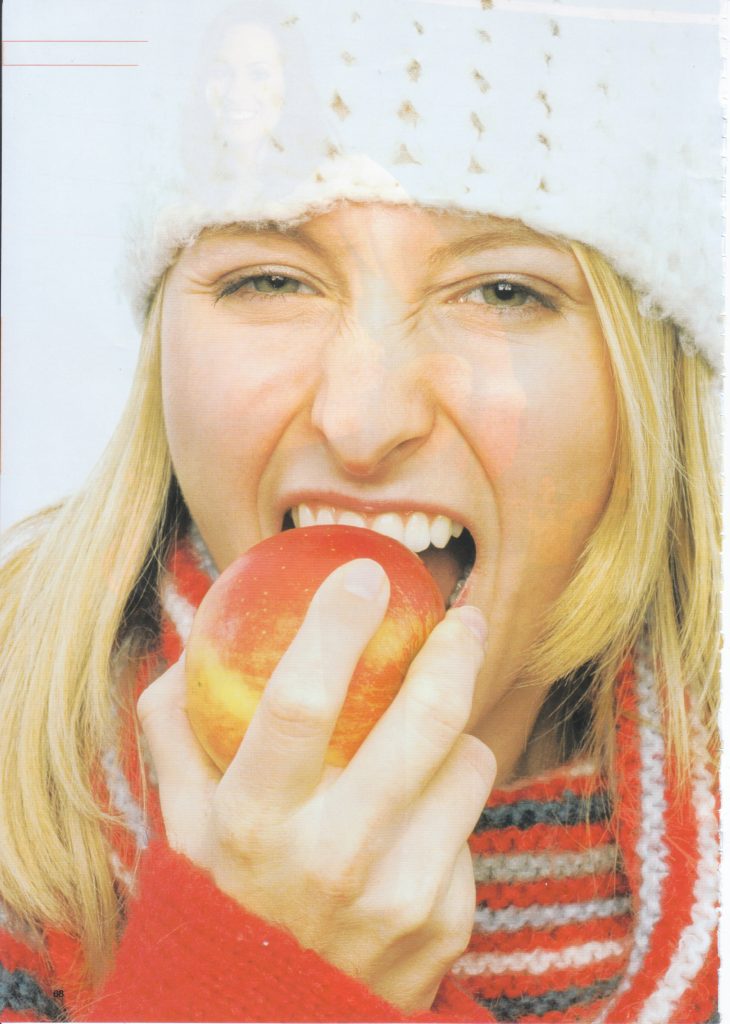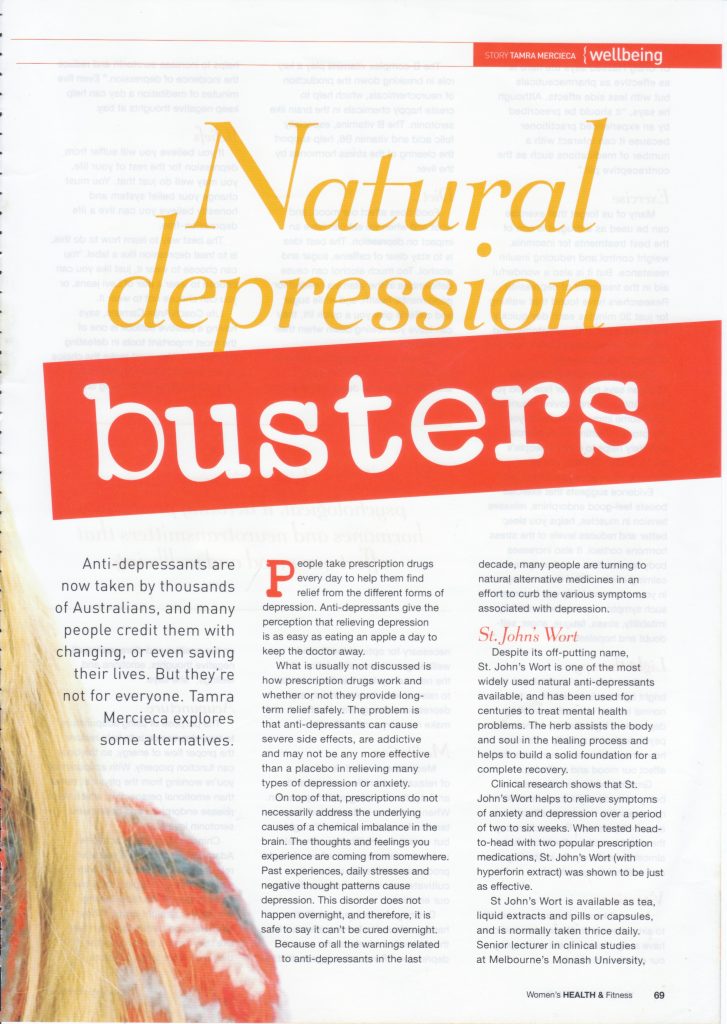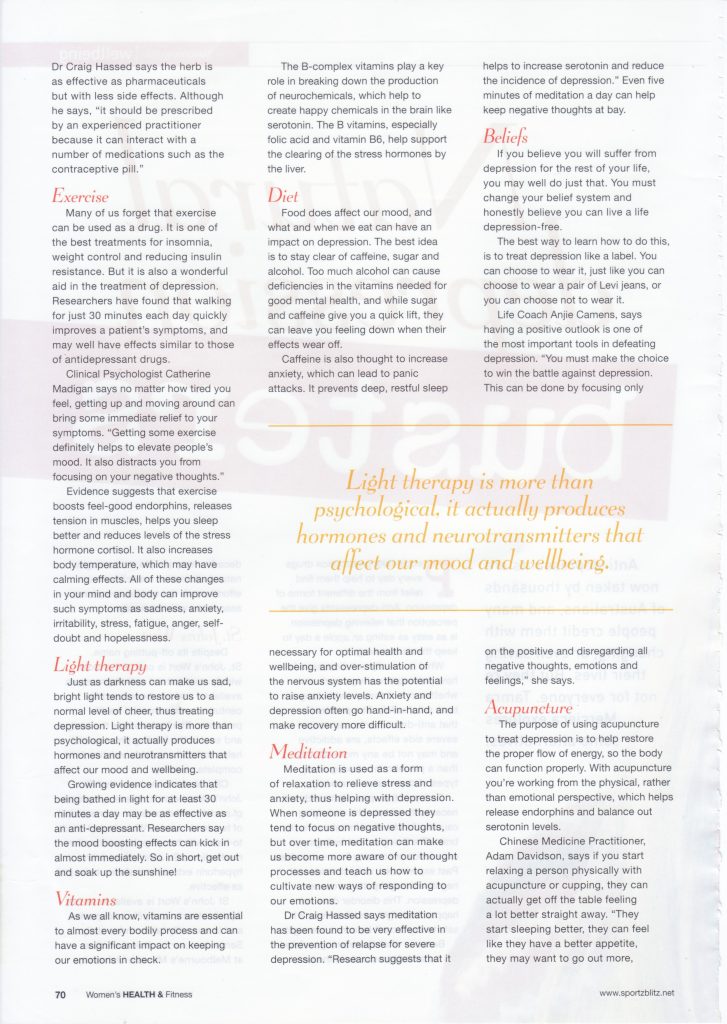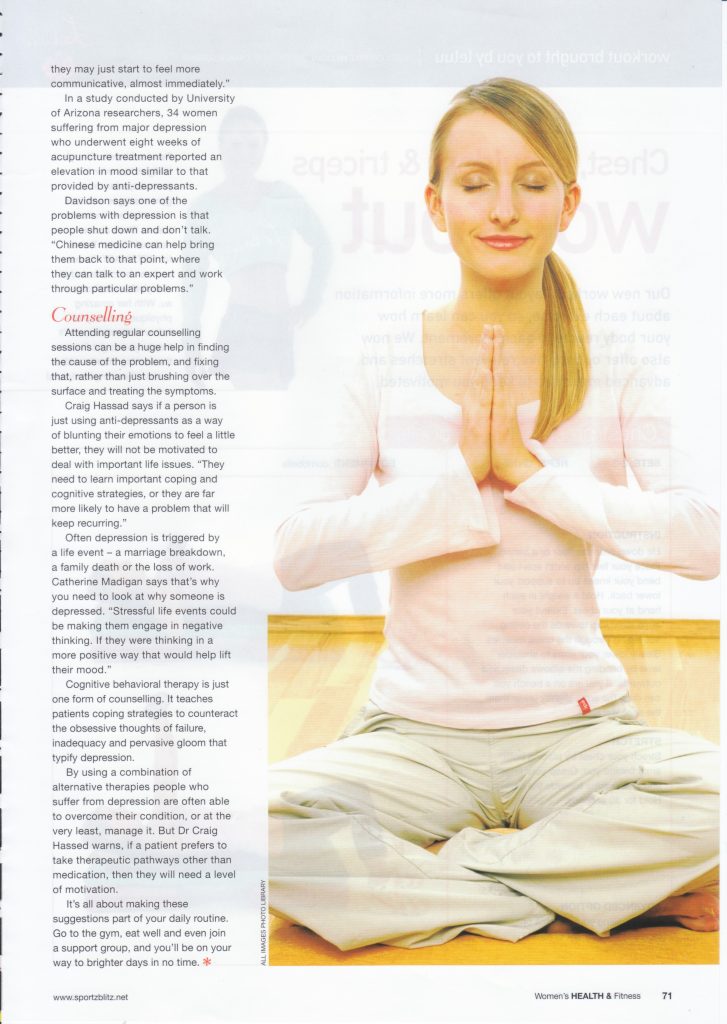



Natural Depression Busters
Anti-depressants are now taken by thousands of Australians, and many people credit them with changing, or even saving their lives. But they’re not for everyone. Tamra Mercieca explores some alternatives.
People take prescription drugs every day to help them find relief from the different forms of depression. Anti-depressants give the perception that relieving depression is as easy as eating an apple a day to keep the doctor away.
What is usually not discussed is how prescription drugs work and whether or not they provide long-term relief safely. The problem is that anti-depressants can cause severe side effects, are addictive and may not be any more effective than a placebo in relieving many types of depression or anxiety.
On top of that, prescriptions do not address the underlying causes of a chemical imbalance in the brain. The thoughts and feelings you experience are coming from somewhere. Past experiences, daily stresses and negative thought patterns cause depression. This disorder does not happen overnight, and therefore, it is safe to say it can’t be cured overnight.
Because of all the warnings related to anti-depressants in the last decade, many people are turning to natural alternative medicines in an effort to curb the various symptoms associated with depression.
St. john’s wort
Despite its off-putting name, St. John’s Wort is one of the most widely used natural anti-depressants available, and has been used for centuries to treat mental health problems. The herb assists the body and soul in the healing process and helps to build a solid foundation for a complete recovery.
Clinical research shows that St. Johns Wort helps to relieve symptoms of anxiety and depression over a period of 2 – 6 weeks. When tested head-to-head with two popular prescription medications, St. Johns Wort with hyperforin extract was shown to be just as effective.
St Johns Wort is available as tea, liquid extracts and pills or capsules, and is normally taken thrice daily. Senior lecturer in clinical studies at Monash University in Melbourne, Dr Craig Hassed says the herb is as effective as pharmaceuticals but with less side effects. Although he says, “it should be prescribed by an experienced practitioner because it can interact with a number of medications such as the contraceptive pill.”
Exercise
Many of us forget that exercise can be used as a drug. It is one of the best treatments for insomnia, weight control, and reducing insulin resistance. But it is also a wonderful aid in the treatment of depression. Researchers have found that walking for just 30 minutes each day quickly improves a patient’s symptoms and may do so faster than medication.
Clinical Psychologist Catherine Madigan says no matter how tired you feel, getting up and moving around can bring some immediate relief to your symptoms. “Getting some exercise definitely helps to elevate people’s mood. It also distracts you from focusing on your negative thoughts.”
Evidence suggests that exercise boosts feel-good endorphins, releases tension in muscles, helps you sleep better and reduces levels of the stress hormone cortisol. It also increases body temperature, which may have calming effects. All of these changes in your mind and body can improve such symptoms as sadness, anxiety, irritability, stress, fatigue, anger, self-doubt, and hopelessness.
Light Therapy
Just as darkness can make us sad, bright light tends to restore us to a normal level of cheer, thus treating depression. Light is more than psychological, it actually produces hormones and neurotransmitters that affect our mood and well being.
Growing evidence indicates that being bathed in light for at least 30 minutes a day may be as effective as an anti-depressant. Researchers say the mood boosting effects can kick in almost immediately. In comparison, anti-depressants may require a month of use before their effects are felt.
So in short, get out and soak up the sunshine as much as possible.
Vitamins
As we all know, vitamins are essential to almost every bodily process, and can have a significant impact on keeping our emotions in check.
The B-complex vitamins play a key role in breaking down the production of neurochemicals which helps to create happy chemicals in the brain like serotonin. The B vitamins, especially folic acid and vitamin B6, help support the clearing of the stress hormones by the liver.
Diet
Food does affect our mood, and what and when we eat can have an impact on depression. The best idea is to stay clear of caffeine, sugar and alcohol. Too much alcohol can cause deficiencies in the vitamins needed for good mental health, and while sugar and caffeine give you a quick lift, they can leave you feeling down when their effects wear off.
Caffeine is also thought to increase anxiety in people which can lead to panic attacks. It prevents deep, restful sleep necessary for optimal health and well-being, and over-stimulation of the nervous system has the potential to raise anxiety levels. Anxiety and depression often go hand-in-hand, and make recovery more difficult.
Meditation
Meditation is used as a form of relaxation to relieve stress and anxiety, thus helping with depression. When someone is depressed they tend to focus on the negative thoughts, but over time meditation can make us become more aware of our thought processes and teach us how to cultivate new ways of responding to our emotions.
Dr Craig Hassed says meditation has been found to be very effective in the prevention of relapse for severe depression. “Research suggests that it helps to increase serotonin and reduce the incidence of depression.” Even five minutes of meditation a day can help keep the black dog in its kennel.
Beliefs
One of the most important elements of getting over depression is not accepting the doctor’s diagnosis. If you believe you will suffer from depression for the rest of your life, you will. You must change your belief system and honestly believe you can live a life depression-free.
The best way to learn how to do this, is to treat depression like a label. You can choose to wear it, just like you can choose to wear a pair of Levi jeans, or you can choose not to wear it.
Life Coach Anjie Camens, says having a positive outlook is one of the most important tools in defeating depression. “You must make the choice to win the battle against depression. This can be done by focusing only on the positive and disregarding all negative thoughts, emotions and feelings.” TO read more about how to remove limiting beliefs, click here.
Acupuncture
The purpose of using acupuncture to treat depression is to help restore the proper flow of energy, so the body can function properly. With acupuncture you’re working from the physical not emotional perspective, which helps release endorphins and balance out serotonin levels.
Chinese Medicine Practitioner, Adam Davidson, says if you start relaxing a person physically with acupuncture or cupping they can actually get off the table feeling a lot better straight away. “They start sleeping better, they can feel like they have a better appetite, they may want to go out more, they may just start to feel more communicative, almost immediately.”
In a study conducted by University of Arizona researchers, 34 women suffering from major depression who underwent eight weeks of acupuncture treatment reported an elevation in mood similar to that provided by anti-depressants.
Davidson says one of the problems with depression is that people shut down and don’t talk. “Chinese medicine can help bring them back to that point, where they can talk to an expert and work through particular problems”.
Counseling
Attending regular counseling sessions can be a huge help in finding the cause of the problem, and fixing that, rather than just brushing over the surface and treating the symptoms.
Craig Hassad says if a person is just using anti-depressants as a way of blunting their emotions to feel a little better, they will not be motivated to deal with important life issues. “They need to learn important coping and cognitive strategies, or they are far more likely to have a problem that will keep recurring.”
Often depression is triggered by a life event – a marriage breakdown, a family death or the loss of work. Catherine Madigan says that’s why you need to look at why someone is depressed. “Stressful life events could be making them engage in negative thinking. If they were thinking in a more positive way that would help lift their mood.”
Cognitive behavioral therapy is just one form of counseling. It teaches patients coping strategies to counteract the obsessive thoughts of failure, inadequacy and pervasive gloom that typify depression.
__________
By using a combination of alternative therapies people who suffer from depression are often able to overcome their condition, or at the very least, manage it. But Dr Craig Hassed warns, if a patient prefers to take therapeutic pathways other than medication then they will need a level of motivation.
It’s all about making these suggestions part of your daily routine. Go to the gym, eat well and even join a support group, and you’ll be smiling from ear to ear in no time.
If you’re looking to become depression free, click here. I have a five-month One-on-One Intensive where I help guide you to a depression-free life.
